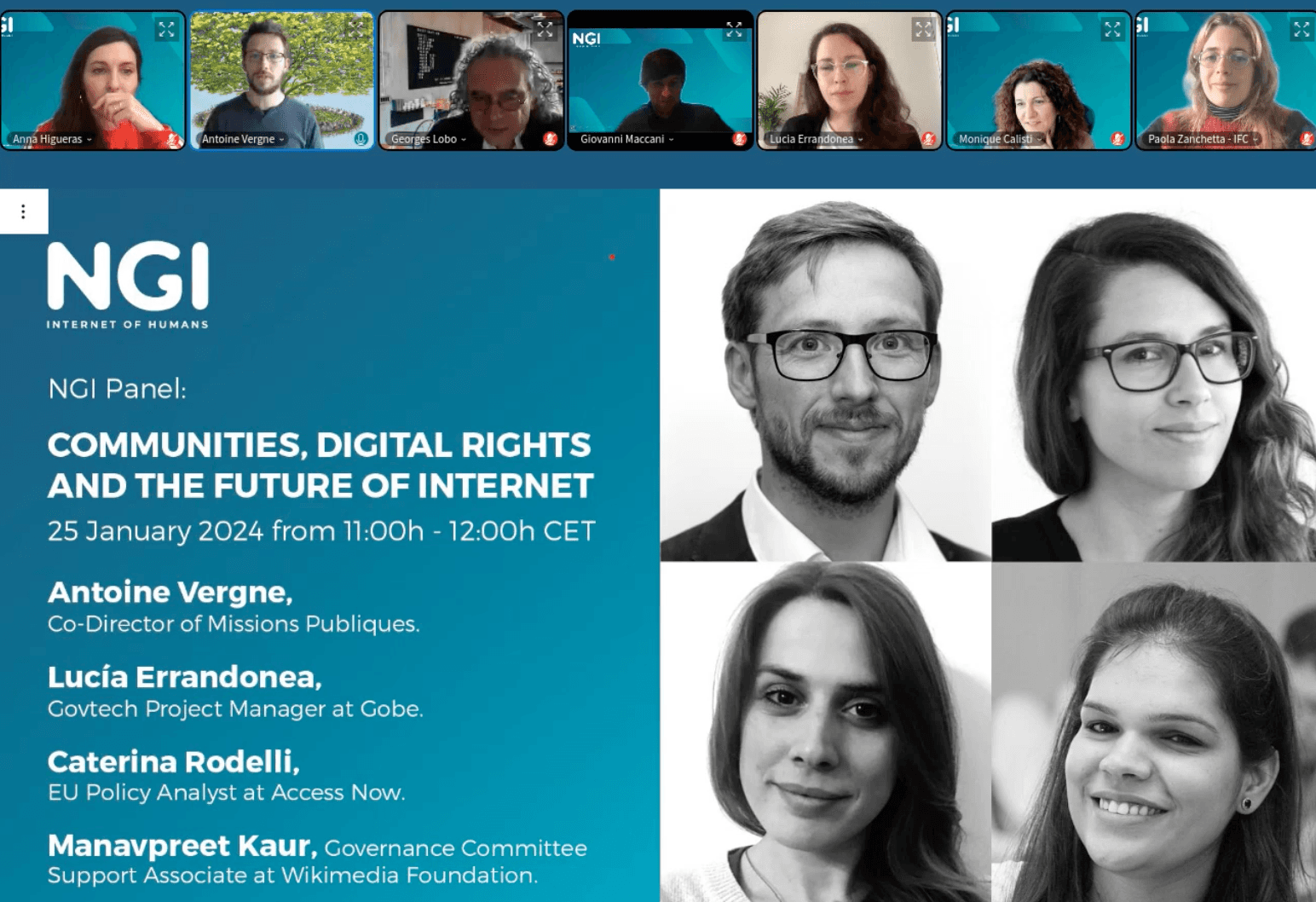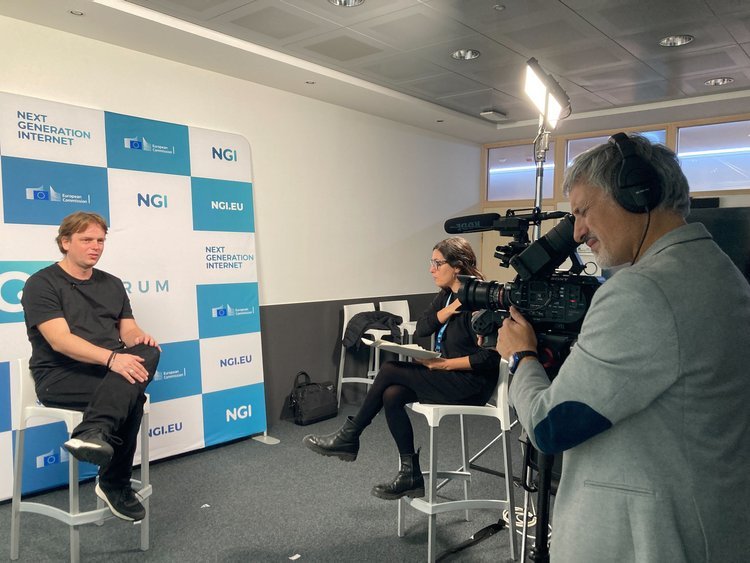Scientific research
Scientific research
DLT4EU: an acceleration programme with an experimental purpose
DLT4EU: an acceleration programme with an experimental purpose
9 de septiembre de 2020


By Anna Higueras, head of projects at Ideas for Change. (Original publication in Spanish)
We have covered half the journey of the program DLT4EU, the project funded by the European Commission that promotes the adoption of DLT solutions (Digital Ledger Technology) to address challenges faced by the public sector in the social and environmental realm, which we drive in collaboration with Ideas for Change, Metabolic and Digital Catapult.
It is a bet with an experimental vocation: how do DLT-type technologies (blockchain is the most well-known, but not the only one) respond when we delve into developing solutions for the public good? Do they provide valid and robust solutions? Are they a good option for that?
"Nothing has changed without experimenting, this is what we call anticipatory innovation"
Piret Tonurist during her presentation at the DLT4EU Public Launch Event in collaboration with MWC
As Piret Tonurist (Innovation Leader at the OECD) announced in the discussion of the DLT4EU Program Launch held on September 17, anticipatory innovation processes are crucial in the development and adoption of new technologies. DLTs are currently an open field for research with enormous potential for advancement. The advantages of their use in the financial sector are well demonstrated, with over 60% of global financial institutions using blockchain applications in 2020. But despite the fact that blockchain is a promising solution for a more decentralized society, with sovereign users of their data leading a social agenda that benefits them, there is still much to do to normalize the applications of DLT for the common good.
In response to the main question: why DLTs or blockchain?, the answer is consolidated: blockchain meets what Dr. Claudio Lima, co-founder of the Blockchain Engineering Council, defined as the 3Ts: “Trust, Traceability and Transparency” (trust, traceability, and transparency). That is, it allows for decentralized, transparent, and validated storage of data. These three characteristics are crucial for the areas that DLT4EU focuses on: the circular economy and digital citizenship, two segments with a global impact for the European agenda and the new Green Deal.
An accelerator pilot
The DLT4EU project, underway since January of this year, is a leading acceleration program (and entirely virtual due to the Covid-19 context) that has brought together eight software development companies with public sector organizations to solve specific, real challenges, all related to urgent societal issues that these organizations face in their daily operations. DLT4EU helps accelerate the development of practical solutions for these challenges by providing participating companies with a program specifically designed to test the behavior of DLT technologies and understand their potential in the social and environmental realms.
The acceleration program started in June and is providing valuable insights both for the project managers (reporting directly to the European Commission) and for the involved teams, in many cases technology companies that are betting on expanding into new areas of operation related to the Public Good.
Solutions to urgent challenges of circular economy and digital citizenship
The eight challenges in the acceleration phase fall within the realm of the circular economy and digital citizenship, two fields where DLT applications can lead to solutions with great development potential.
The circular economy is a model that refocuses the utilization of resources and needs (human, productive) towards strategies of cyclical use, extending the lifespan of resources, minimizing waste generation, and enabling a fairer social redistribution with a low ecological 'footprint'.
The challenges of DLT4EU in acceleration under this umbrella are related to the refurbishment of unused electronic materials, the possibilities of integrating sustainable transport methods in the city, or the repurposing and thorough recycling of textiles.
For example, the Spanish association Ereuse, is developing a circular consumption system for electronic equipment from the City Council of Sant Boi, extending their useful life and promoting the reuse of this equipment by vulnerable families in the city.
Digital citizenship can be broadly defined as the application of digital technologies to better facilitate and engage citizens in public decision-making, service improvement, and social impact initiatives. This can develop at the local/municipal or national level. The challenges of DLT4EU in the acceleration phase focus on digital inclusion, monitoring and accountability in the granting of aid, the management of personal data in accordance with models of citizen sovereignty and investment models using community currencies.
For example, the British platform Alice.si, is systematizing the visualization of data from charitable aid with Vodafone Foundation, simplifying reporting, verification, and accountability processes, and creating a system of SSI (self-sovereign identity) for beneficiaries of their humanitarian development programs.

DLTs for the common good
The solutions under development within the DLT4EU program are just a sample of the broad spectrum of possibilities presented by the potential use of DLT technologies for social and environmental purposes: areas such as traceability in supply chains or recycling, property transfers in secondary markets or management in the use of public infrastructure. And under the umbrella of digital citizenship: the transfers of personal data (for example, health), or systems of identification, inclusion, and community participation.
The nature of these technologies allows identifying (anonymously) and tracing a path (authentically and transparently) of the data generated throughout the process, making it possible to establish successful patterns and understand in depth which solutions have the greatest impact.
Therefore, it is an exciting moment to test blockchain, whether the goal is to reshape the management of citizen data, or whether the interest lies in advancing toward new forms of trust in processes for the common good.
The results of the DLT4EU acceleration program will be presented in February at an open event at the European Commission.
By Anna Higueras, head of projects at Ideas for Change. (Original publication in Spanish)
We have covered half the journey of the program DLT4EU, the project funded by the European Commission that promotes the adoption of DLT solutions (Digital Ledger Technology) to address challenges faced by the public sector in the social and environmental realm, which we drive in collaboration with Ideas for Change, Metabolic and Digital Catapult.
It is a bet with an experimental vocation: how do DLT-type technologies (blockchain is the most well-known, but not the only one) respond when we delve into developing solutions for the public good? Do they provide valid and robust solutions? Are they a good option for that?
"Nothing has changed without experimenting, this is what we call anticipatory innovation"
Piret Tonurist during her presentation at the DLT4EU Public Launch Event in collaboration with MWC
As Piret Tonurist (Innovation Leader at the OECD) announced in the discussion of the DLT4EU Program Launch held on September 17, anticipatory innovation processes are crucial in the development and adoption of new technologies. DLTs are currently an open field for research with enormous potential for advancement. The advantages of their use in the financial sector are well demonstrated, with over 60% of global financial institutions using blockchain applications in 2020. But despite the fact that blockchain is a promising solution for a more decentralized society, with sovereign users of their data leading a social agenda that benefits them, there is still much to do to normalize the applications of DLT for the common good.
In response to the main question: why DLTs or blockchain?, the answer is consolidated: blockchain meets what Dr. Claudio Lima, co-founder of the Blockchain Engineering Council, defined as the 3Ts: “Trust, Traceability and Transparency” (trust, traceability, and transparency). That is, it allows for decentralized, transparent, and validated storage of data. These three characteristics are crucial for the areas that DLT4EU focuses on: the circular economy and digital citizenship, two segments with a global impact for the European agenda and the new Green Deal.
An accelerator pilot
The DLT4EU project, underway since January of this year, is a leading acceleration program (and entirely virtual due to the Covid-19 context) that has brought together eight software development companies with public sector organizations to solve specific, real challenges, all related to urgent societal issues that these organizations face in their daily operations. DLT4EU helps accelerate the development of practical solutions for these challenges by providing participating companies with a program specifically designed to test the behavior of DLT technologies and understand their potential in the social and environmental realms.
The acceleration program started in June and is providing valuable insights both for the project managers (reporting directly to the European Commission) and for the involved teams, in many cases technology companies that are betting on expanding into new areas of operation related to the Public Good.
Solutions to urgent challenges of circular economy and digital citizenship
The eight challenges in the acceleration phase fall within the realm of the circular economy and digital citizenship, two fields where DLT applications can lead to solutions with great development potential.
The circular economy is a model that refocuses the utilization of resources and needs (human, productive) towards strategies of cyclical use, extending the lifespan of resources, minimizing waste generation, and enabling a fairer social redistribution with a low ecological 'footprint'.
The challenges of DLT4EU in acceleration under this umbrella are related to the refurbishment of unused electronic materials, the possibilities of integrating sustainable transport methods in the city, or the repurposing and thorough recycling of textiles.
For example, the Spanish association Ereuse, is developing a circular consumption system for electronic equipment from the City Council of Sant Boi, extending their useful life and promoting the reuse of this equipment by vulnerable families in the city.
Digital citizenship can be broadly defined as the application of digital technologies to better facilitate and engage citizens in public decision-making, service improvement, and social impact initiatives. This can develop at the local/municipal or national level. The challenges of DLT4EU in the acceleration phase focus on digital inclusion, monitoring and accountability in the granting of aid, the management of personal data in accordance with models of citizen sovereignty and investment models using community currencies.
For example, the British platform Alice.si, is systematizing the visualization of data from charitable aid with Vodafone Foundation, simplifying reporting, verification, and accountability processes, and creating a system of SSI (self-sovereign identity) for beneficiaries of their humanitarian development programs.

DLTs for the common good
The solutions under development within the DLT4EU program are just a sample of the broad spectrum of possibilities presented by the potential use of DLT technologies for social and environmental purposes: areas such as traceability in supply chains or recycling, property transfers in secondary markets or management in the use of public infrastructure. And under the umbrella of digital citizenship: the transfers of personal data (for example, health), or systems of identification, inclusion, and community participation.
The nature of these technologies allows identifying (anonymously) and tracing a path (authentically and transparently) of the data generated throughout the process, making it possible to establish successful patterns and understand in depth which solutions have the greatest impact.
Therefore, it is an exciting moment to test blockchain, whether the goal is to reshape the management of citizen data, or whether the interest lies in advancing toward new forms of trust in processes for the common good.
The results of the DLT4EU acceleration program will be presented in February at an open event at the European Commission.


